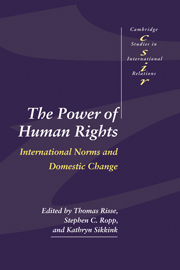Book contents
- Frontmatter
- Contents
- List of contributors
- Preface
- 1 The socialization of international human rights norms into domestic practices: introduction
- 2 Transnational activism and political change in Kenya and Uganda
- 3 The long and winding road: International norms and domestic political change in South Africa
- 4 Changing discourse: transnational advocacy networks in Tunisia and Morocco
- 5 Linking the unlinkable? International norms and nationalism in Indonesia and the Philippines
- 6 International norms and domestic politics in Chile and Guatemala
- 7 The Helsinki accords and political change in Eastern Europe
- 8 International human rights norms and domestic change: conclusions
- List of references
- Index
- Cambridge Cultural Social Studies
6 - International norms and domestic politics in Chile and Guatemala
Published online by Cambridge University Press: 07 December 2009
- Frontmatter
- Contents
- List of contributors
- Preface
- 1 The socialization of international human rights norms into domestic practices: introduction
- 2 Transnational activism and political change in Kenya and Uganda
- 3 The long and winding road: International norms and domestic political change in South Africa
- 4 Changing discourse: transnational advocacy networks in Tunisia and Morocco
- 5 Linking the unlinkable? International norms and nationalism in Indonesia and the Philippines
- 6 International norms and domestic politics in Chile and Guatemala
- 7 The Helsinki accords and political change in Eastern Europe
- 8 International human rights norms and domestic change: conclusions
- List of references
- Index
- Cambridge Cultural Social Studies
Summary
Introduction
Human rights principles have long resonated in Latin America. Policy makers, legal scholars, and activists throughout the region have historically advocated regional and international human rights norms. Latin American states lobbied for human rights language in the United Nations Charter, adopted the American Declaration of the Rights and Duties of Man in 1948, and unanimously supported, later that same year, the Universal Declaration of Human Rights. But Latin Americans have also been firm advocates of principles of sovereignty and nonintervention, and when norms of sovereignty and human rights came into conflict, sovereignty usually won. By the 1980s, however, regional and international human rights regimes and networks began to have more acceptance and impact in Latin America (Sikkink 1997).
In this chapter, we examine this process through an exploration of the human rights situations in Chile and Guatemala during the period 1973 to 1998. Few countries in Latin America are as different as Chile and Guatemala. Yet despite these differences, in the 1970s and 1980s harsh authoritarian regimes in both countries unleashed more intense state terror against the population than at any previous time in their history (Medina Quiroga 1988, Figueroa Ibarra 1991). Of the two cases, repression was far more severe in Guatemala than in Chile, though the Chilean case received more international attention. By the 1990s, both countries were governed by democratic regimes, although “authoritarian enclaves” and structures remained (Garretón 1991). The transition to rule-consistent human rights behavior has been more complete in the Chilean case, while in Guatemala the process is more uncertain and still in flux.
- Type
- Chapter
- Information
- The Power of Human RightsInternational Norms and Domestic Change, pp. 172 - 204Publisher: Cambridge University PressPrint publication year: 1999
- 28
- Cited by

